- Key sustainability target achieved 20 years ahead of schedule
- First batches of C02-reduced steel already available from stock
- Data and digitalization crucial levers for green supply chains
thyssenkrupp Materials Services is reaffirming its own sustainability ambitions and significantly increasing the climate protection targets it has set itself: The company will operate on a climate neutral basis worldwide as early as 2030 – around 20 years earlier than originally set. "With this decision, we are taking responsibility in the fight against climate change and making clear our claim to leadership in the industry. After all, as the biggest mill-independent materials distribution and service provider in the Western world, we can exert an influence in over 40 countries around the world," says Martin Stillger, Chairman of the Executive Board of Materials Services.
In the area of climate protection, the company focuses on those aspects where improvements can be made through its own efforts: For example, all direct emissions at the more than 400 locations worldwide and all the company's own indirect emissions from energy consumption are reduced as far as possible. In this way Materials Services achieves a reduction in CO2 emissions of more than 100,000 tons per year by 2030. This corresponds to the consumption of a small German town with around 12,500 inhabitants and is around 60 percent less than in fiscal year 2017/2018 (187,220 tons). Energy efficiency programs, the switch to green electricity, investments in photovoltaics and the switch to LED lighting, for example, all serve to achieve this goal. The service center in Krefeld will be the first Materials Services location to operate climate neutrally by 2024.
Emissions that cannot yet be avoided with the current status because neither corresponding technologies nor the necessary infrastructure are currently available on the market are offset by climate protection projects. This applies, for example, to parts of the company’s own truck fleet or to special machinery and vehicles in the area of steel mill services in Germany. "It goes without saying that we will invest in appropriate technologies for greater climate neutrality as soon as they are available," says Stillger.
Further focus on green customer products and solutions: first CO2-reduced steel already available
In addition to its own goal of becoming a climate-neutral organization by 2030, the company also wants to support its customers in this challenge. Various levers will be used to achieve this. First, thyssenkrupp Materials Services will increasingly offer CO2-reduced products in the future – the first batches of C02-reduced steel are already available to customers. Second, the portfolio includes services to make customers' supply chains sustainable, such as solutions to reduce greenhouse gases or recycle products. "Our customers are already increasingly concerned with sustainability. It's not just about green products, it's about compliance with all standards along the supply chain and optimizing them," explains Martin Stillger.
Digitalization as a key driver: "Bits replace tons"
The power of data and digitalization are essential for the implementation of the measures, because they ensure transparency and thus also sustainable action along the entire supply chain. In the sense of "bits replace tons", the use of goods and materials management can be made significantly more efficient. This supply chain optimization allows for "green" effects to be achieved through less waste in procurement, scheduling, production, processing, transport and logistics. In the automotive industry, for example, the company uses an AI solution that helps minimize waste in the supply chain. Incorrect deliveries are avoided, and inventory costs, storage costs and the number of transports are reduced.
Sustainability follows a holistic approach
Sustainability is firmly anchored in the corporate strategy "Materials as a Service" and follows a holistic approach that goes far beyond the "green" aspect. In line with the internationally known ESG criteria, the company is also working on initiatives and projects that promote diversity and social commitment and raise standards along the supply chain.


